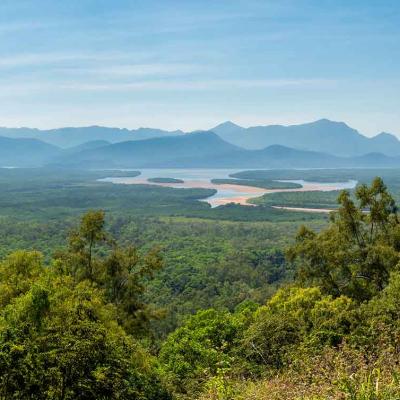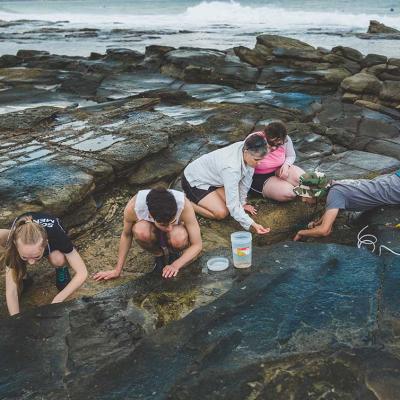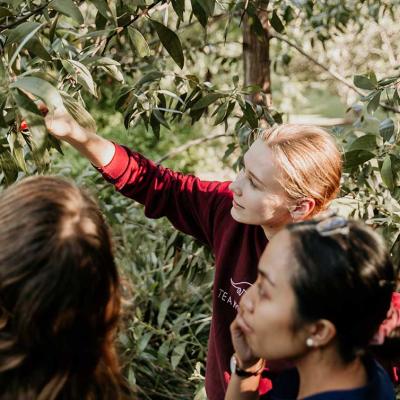If you’re passionate about tackling environmental challenges and shaping a sustainable future, UQ’s postgraduate programs in environmental management are your gateway to making a positive impact.
Designed for aspiring environmental leaders, the programs offer a diverse selection of environment courses that blend theory, field experience, and industry insights. Here are 5 standout courses in environment and sustainability that will equip you with the skills and knowledge to make a difference.
- Conservation and Wildlife Biology
- Environmental Problem Solving
- Introduction to Earth Observation Sciences
- Sustainable Business Practice
- Climate Change and Environmental Management
Conservation and Wildlife Biology
Understanding and protecting biodiversity is at the heart of environmental management. In this course, you’ll explore the science behind wildlife conservation, covering key ecological principles, species management, and habitat protection strategies. A strong focus on practical learning means you’ll gain hands-on experience in population monitoring, ecological surveying, and conservation planning.
“This course provides students with a capstone experience and understanding of wildlife and conservation, including the interactions between humans and wildlife, how we decide what to conserve, and the important tools required for future careers in conservation and management,” UQ’s Professor Salit Kark says.
“Students will debate and learn from examples from around the world, will experience a team project about human-wildlife interactions from start to delivery, and will workshop timely topics that impact wildlife conservation, such as wildfires.”
For UQ graduate Lauren Ohayon, the course was instrumental in shaping her conservation knowledge and skills.
“This course provided me with a comprehensive overview of biodiversity conservation and wildlife management, enriched by real-life case studies,” Lauren said.
“It deepened my understanding of the complexities involved in conservation efforts and helped expand my knowledge by showcasing practical examples of how these principles can be applied.”
Fieldwork is a key component of the course, with opportunities to use techniques like camera trapping, radio telemetry, and genetic sampling to track and study wildlife. You’ll also have access to UQ’s cutting-edge research facilities, including the UQ Wildlife Genetics Lab, where DNA analysis helps inform conservation efforts.
“One of my favourite aspects of the course was the opportunity to work on a hands-on project,” Lauren said.
“I also really enjoyed the data analysis component, as it helped me refine my statistical skills—an essential tool that I can apply to future research.”
The course also strengthened Lauren’s collaborative skills, a crucial asset in conservation work.
“One of the most valuable skills I gained was the ability to collaborate effectively with others, both within my field and across disciplines,” she said.
“Conservation is inherently interconnected and cannot happen in isolation.
“Through group projects and coursework, we learned how to integrate different perspectives and work as part of a team to develop well-rounded conservation strategies.
“This experience has strengthened my ability to communicate complex ecological concepts and problem-solve in diverse settings.”
Whether you're passionate about saving endangered species or restoring vital ecosystems, this course equips you with the tools to make a tangible impact.
“I would highly recommend this course to anyone passionate about conservation,” Lauren said.
“It helped prepare me by turning theoretical knowledge into hands-on skills, allowing me to apply what I learned in real-world settings.
“The combination of field experience, data analysis, and collaborative projects gave me practical tools that will be invaluable for further study and a career in conservation, ecology, or wildlife management.”
Graduates of the course have gone on to work in government conservation research and management, non-governmental conservation organisations, the private sector, media, environmental and biodiversity consultancies, and more around the globe.
Environmental Problem Solving
Solving environmental problems is critical to creating a sustainable future. As the world faces escalating challenges like climate change, biodiversity loss, and resource scarcity, the ability to make well-informed, balanced decisions has never been more important. Environmental Problem Solving prepares you to contribute to solutions that protect ecosystems, support communities, and shape a more resilient planet.
“Developing practical solutions to complex environmental challenges is at the heart of this course,” course lecturer Professor Richard Fuller says.
“During the course, you’ll explore structured approaches to decision-making that help navigate uncertainty, balance competing priorities, and engage diverse stakeholders.
“With a strong focus on real-world application, you’ll build the skills to define clear objectives, analyse consequences, and apply decision-making tools to solve pressing environmental issues.”
But Professor Fuller warns that while the work is rewarding, it can be suitably challenging too.
"Saving the planet is tough work – environmental problems can be complex, with competing goals and stakeholders with myriad values and opinions.
“In this course, we'll teach you a process for analysing problems that separates the values from the science, and helps you arrive at decisions that are more likely to give better environmental, social, and economic outcomes."
Delivered through an interactive online learning platform, the course combines video and written content with weekly expert-led workshops designed to deepen your understanding and put your skills into practice.
"This course will change how you approach decision-making as environmental managers—and it might even help you analyse some of the big decisions in your personal life," Professor Fuller said.
For UQ graduate David Soulema, the course provided valuable insights into applying systems thinking and technical knowledge to real environmental challenges.
“I come from a French School of Engineering where I focused on mathematics, physics, and systems thinking,” David said. “I wanted to apply this knowledge to something that made sense to me—preserving the environment.
“There’s no better place than Australia, with its unique wildlife, and UQ’s range of environmental programs offered a guarantee of quality.
“ENVM7512 [Environmental Problem Solving] provided me with interesting insights into real-world methods for addressing environmental problems.
David said one of the most valuable takeaways was learning how to break down complex problems to reduce bias and create more robust solutions.
“Problem-solving is already challenging without adding incredibly complex sustainability features like biodiversity conservation and people’s opinions.
“Learning how to chunk down problems and conduct an error-proof solving process was definitely the best skill I learned.”
A highlight for David was working on a flying-fox conservation case study, which allowed him to apply these skills in a practical setting.
“We had to define the problem ourselves and then investigate stakeholders’ opinions to create our own framework for finding the best management strategies that met an overall compromise.”
David said the course also helped him appreciate the importance of working with people from diverse backgrounds.
“Coming from an engineering background with a strong logical and systems-thinking focus, the course content felt natural for me.
“But working in groups made me realise how differently others might approach problems—and that’s critical in environmental management, where diverse perspectives matter.
“Our brains work with biases, but managing the environment is such an intricate and complex task that we cannot afford those biases to mislead our decisions.
“This course provides a complete overview of how to reduce those biases step by step.”
Introduction to Earth Observation Sciences
Remote sensing and geospatial analysis are transforming the way we understand and manage the environment. This course introduces you to cutting-edge earth observation technologies, including satellite imaging, drone-based surveys, and Geographic Information Systems (GIS). You’ll learn how to monitor deforestation, track climate change impacts, and assess conservation efforts on a global scale—all from your computer screen.
"This course engages students with leading developments in satellite, airborne, and drone data collection and analyses through industry and government-linked workshops and projects,” UQ’s Professor Stuart Phinn says.
Master of Geographic Information Science student Erik Sumarkho, who works in the Bushfire Risk and Evaluation Unit of NSW National Parks and Wildlife Service, said the course gave him valuable tools for his role at the intersection of bushfire management and koala conservation.
“As land managers, we cannot be everywhere all the time, yet having a picture of what’s going on out there in the bush is important—this is what remote sensing does for us.”
Erik applies remote sensing skills in his work, using spaceborne light detection and ranging data from NASA’s Global Ecosystem Dynamics Investigation to map fuel structure and height.
“Since satellites provide data through space and time, we can get a picture of the fire hazard all the time and before every bushfire season,” he said.
“For example, if we want to work with a research group to map landscape fuel flammability and understand where aerial ignition should be avoided to prevent trees burning down, I now have the technical understanding to achieve this.
"A major drawcard is the opportunity to use UQ’s state-of-the-art spatial analysis labs, where you’ll work with real-time satellite data and advanced mapping software."
These skills are highly sought after in industries such as climate science, natural resource management, and disaster response, giving you a competitive edge in the job market.
Sustainable Business Practice
Environmental sustainability isn’t just a scientific challenge—it’s a business imperative. The Sustainable Business Practice course bridges the gap between environmental science and corporate strategy, giving you the skills to drive sustainable decision-making in businesses and organisations.
“This course equips postgraduate students with cutting-edge environmental, social and governance frameworks, real case studies, and industry best practices,” UQ’s Dr Anthony Halog, senior lecturer for the course, says.
“You’ll explore key topics like corporate social responsibility, environmental impact assessments, and sustainable supply chains, learning how companies can reduce their ecological footprint while staying competitive.
“With access to expert guest lecturers, live panel discussions, and practical sustainability tools, students gain critical insights into green finance, circular economy strategies, and corporate sustainability reporting—preparing them for leadership in sustainable business.”
Master of Business student Chelsey (Kwok Ka Hei) said the course transformed her perspective on sustainability in business.
“I’ve seen how companies integrate environmental, sustainability, and governance practices into their core strategies, not just as a regulatory requirement but as a value driver for long-term resilience and competitive advantage.”
By the end of the course, you’ll have the tools to influence sustainability policy in corporate settings, making you a valuable asset in any sector.
Climate Change and Environmental Management
With climate change being one of the most urgent global challenges, this course provides a deep dive into its causes, impacts, and mitigation strategies. You’ll examine the science behind climate change, explore adaptation policies, and assess risks to ecosystems, economies, and communities.
“Whether you are an environmental manager, engineer, lawyer, health worker, policy maker, or work in business, you will be impacted both personally and professionally by climate change,” UQ Professor and course lecturer Helen Bostock says.
“This course will teach you how to assess climate risk, and then how to improve your climate resilience through a range of adaptation and mitigation options.”
Master of Environmental Management graduate and current UQ tutor and PhD candidate Tom Deweerdt found the course to be a crucial foundation for his career.
“The Climate Change and Environmental Management course provided a comprehensive understanding of the global climate crisis by examining scientific evidence, potential future scenarios, and their implications for environmental management,” Tom said.
“It helped me critically assess the multifaceted impacts of climate change and explore practical solutions for adaptation and mitigation.”
Hands-on learning opportunities include climate modelling exercises, carbon footprint assessments, and policy analysis workshops.
“The interactive components of the course were particularly valuable,” Tom said.
“Policy analysis introduced me to frameworks like the Policy Cycle, which I still use to assess the effectiveness of climate policies.
“Scenario modelling was another crucial skill, allowing us to project species population trends under different climate scenarios and understand their long-term implications.”
A particularly impactful case study examined climate-induced risks for a camping and caravan resort in Palm Cove. Using tools like The Long Paddock, students assessed how rising sea levels could leave the site underwater by 2050, requiring urgent adaptation strategies.
“This case study reinforced the practical applications of climate risk assessment and adaptation planning,” Tom said.
“Many Australian businesses are located in coastal areas vulnerable to climate change, making these skills essential.”
One of the key highlights of the course is its focus on climate solutions, empowering students to take action on climate change through their professional careers and personal actions to protect society and ecosystems.
You’ll also gain access to UQ’s leading climate research institutes, working with experts on projects that tackle pressing environmental issues. Whether you’re interested in shaping climate policy, working in sustainability consulting, or contributing to conservation initiatives, this course equips you with the knowledge and skills to be part of the solution.
Tom strongly recommends this course to anyone looking to make a meaningful impact in climate and environmental management.
“I think this is one of the most essential courses in the Master of Environmental Management, and I highly recommend taking it early in the program.
Tom says the course both shaped his research and equipped him with practical skills that he continues to use today.
“One of the most valuable skills I gained was the ability to analyse different climate change scenarios developed by the IPCC and apply them to risk assessments in specific sectors,” he said.
“Understanding how to assess potential climate risks and their implications has been crucial in my research and will continue to be an essential skill in both academia and industry.”
How you can study environmental management at UQ
You can study the 5 courses listed above in any of these postgraduate environmental management programs at UQ:
- Master of Environmental Management
- Graduate Diploma in Environmental Management
- Graduate Certificate in Environmental Management
Shape your future in environmental management
UQ’s postgraduate programs in environmental management provide a dynamic and comprehensive pathway for those looking to drive real change in sustainability, conservation, and climate action. Whether you’re passionate about protecting biodiversity, leveraging cutting-edge technology for environmental solutions, or shaping sustainability policies, these courses will equip you with the knowledge, skills, and hands-on experience to make a lasting impact.
Ready to lead the way in environmental management? Explore our programs today and take the next step toward a more sustainable future.










